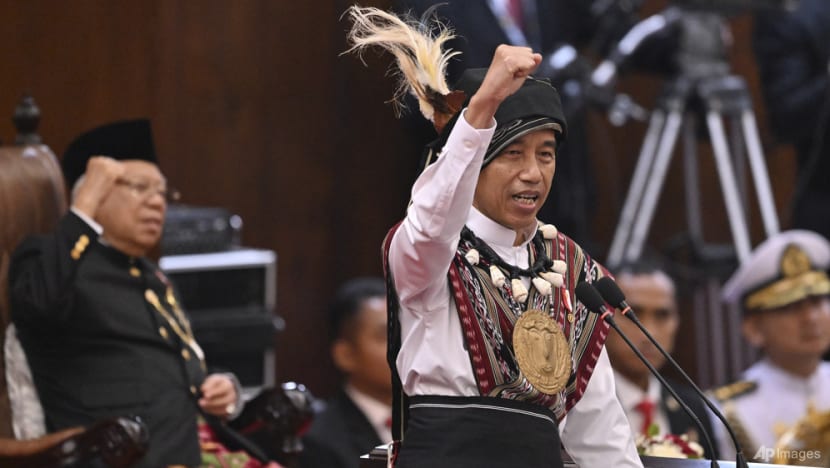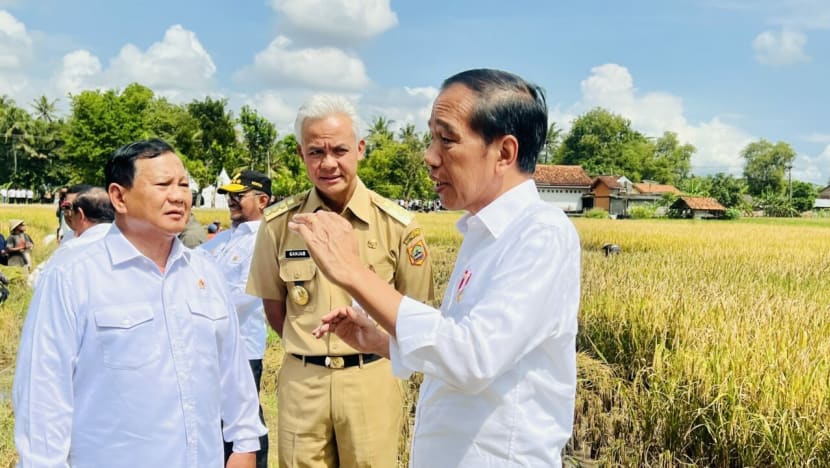Relocation of Indonesia's capital city 'one of the biggest question marks' of Jokowi's leadership: Analyst
The Indonesian presidential election is set to take place in February next year and incumbent Joko Widodo will leave office eight months later in October.

Indonesian President Joko Widodo, wearing traditional attire from Tanimbar Islands of Maluku province, raises his fist as he shouts "Merdeka" (freedom) as he delivers his State of the Nation Address on Aug 16, 2023. (Photo: AP/Adek Berry)
Even as Indonesian president Joko Widodo underscores his presidential achievements as he approaches the end of his term, his plan to move the country’s capital from megacity Jakarta to East Kalimantan will be “one of the biggest question marks” of his leadership, an analyst said on Wednesday (Aug 16), following Mr Widodo’s annual State of the Nation Address ahead of the country's 78th Independence Day.
The proposed new capital, Nusantara, is the flagship project of Jokowi, as the president is popularly known, and is expected to be a green, smart city spanning nearly 260,000 hectares. It will take a vast sum of money to partially bring the plan into fruition, Emeritus Professor Greg Fealy told CNA’s Asia Now.
“As much as Jokowi wants it to be his signature element of his 10-year presidency, I think once he leaves office in October next year, his successors are going to have to look at this very closely,” said Prof Fealy, from the Department of Political and Social Change at the Australian National University
“It’s going to absorb so much money and that money could potentially be used for a whole lot of other things that will deliver a bigger dividend for Indonesia nationally.
While Mr Widodo is likely to be able to partially open the new capital, which is slated to be officially declared in the first half of 2024, there are “increasing doubts” on whether the full plan of the capital city relocation will take place, he said.
The project has attracted very few international investors and will create enormous pressure for Indonesia if the country has to fund most of it independently, he added.
The relocation is expected to come with a price tag of US$34 billion.
JOKOWI'S ACHIEVEMENTS
Indonesia has successfully controlled the COVID-19 pandemic while growing its economy, all this while exercising global leadership amid geopolitical tensions, Mr Widodo said in his address.
The president is hoping to underscore at every point his achievements in office, which are primarily in ensuring that Indonesia has had a very quick recovery from the COVID-19 slump, said Prof Fealy.
He noted that the Southeast Asian nation has experienced more than 5 per cent economic growth and that there has been reasonable growth in employment and a reduction in poverty.
“There's been large investments in infrastructure and a lot of Indonesians can really notice a difference in that - better road systems, transport systems. It's not perfect, but they can see a manifest difference in Indonesia now to what it was when he took office,” he said.
However, he added a “regrettable element” of Mr Widodo’s presidency is intimidation and state repression of people who are critics of the government or dissenters of government policies.
While he may not have orchestrated the actions, he has nonetheless allowed them to happen, Prof Fealy noted.
SEARCH FOR JOKOWI'S SUCCESSOR
With the Indonesian presidential election set to take place in February next year and Mr Widodo leaving office eight months later in October, the president’s emphasis on leaders needing the public’s trust is “interesting”, said Dr Dirk Tomsa, Associate Professor in Politics at La Trobe University in Melbourne, Australia.
“That's a little hint to his successors that he's done really well and that the candidates who are currently vying to succeed him, should listen to him,” said Assoc Prof Tomsa, who is also head of the Department of Politics, Media and Philosophy.
While Mr Widodo is keeping his cards close to his chest and has not revealed who he is backing, there are signs that he is leaning towards one of three frontrunners, Mr Prabowo Subianto, who is serving as Defence Minister in the current Cabinet.
The head of the Gerindra Party has run for president twice but lost to Mr Widodo both times.

The other candidates are former Jakarta governor Anies Baswedan and Mr Ganjar Pranowo from the Indonesian Democratic Party of Struggle (PDI-P).
“It seems that Jokowi feels as if Prabowo may sort of protect Jokowi’s legacy, perhaps a bit better than any of the other candidates,” said Assoc Prof Tomsa.
Prof Fealy similarly said that Mr Widodo is “increasingly leaning” towards Mr Subianto.
Mr Jokowi’s public approval rating is at 82 per cent, Prof Fealy noted, citing a recent report by two prominent survey organisations.
“In a close-run presidential election, having the tacit support of a person who’s as popular as Jokowi could really be the decisive factor in ensuring that, or in leading to Prabowo becoming the next president,” he said.
“That's the game Jokowi is playing. He's not overtly saying he's for one candidate or another, but nonetheless, if you look closely at the signs, he's putting winds in the sails of Prabowo.”


















